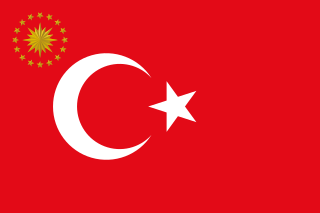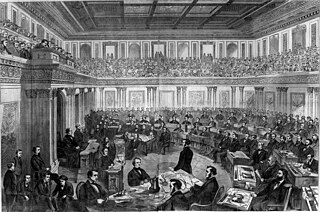Related Research Articles

Impeachment is a process by which a legislative body or other legally constituted tribunal initiates charges against a public official for misconduct. It may be understood as a unique process involving both political and legal elements.

The president of Turkey, officially the president of the Republic of Türkiye, is the head of state and head of government of Turkey. The president directs the executive branch of the national government and is the commander-in-chief of the Turkish military. The president also heads the National Security Council.
A motion or vote of no confidence is a motion and corresponding vote thereon in a deliberative assembly as to whether an officer is deemed fit to continue to occupy their office. The no-confidence vote is a defining constitutional element of a parliamentary system, in which the executive's mandate rests upon the continued support of the majority in the legislature. Systems differ in whether such a motion may be directed against the prime minister, against individual cabinet ministers, against the cabinet as a whole, or some combination of the above.
A supermajority is a requirement for a proposal to gain a specified level of support which is greater than the threshold of one-half used for a simple majority. Supermajority rules in a democracy can help to prevent a majority from eroding fundamental rights of a minority, but can also hamper efforts to respond to problems and encourage corrupt compromises at times when action is taken. Changes to constitutions, especially those with entrenched clauses, commonly require supermajority support in a legislature. Parliamentary procedure requires that any action of a deliberative assembly that may alter the rights of a minority have a supermajority requirement, such as a two-thirds vote. In consensus democracy the supermajority rule is applied in most cases.
The dissolution of a legislative assembly is the simultaneous termination of service of all of its members, in anticipation that a successive legislative assembly will reconvene later with possibly different members. In a democracy, the new assembly is chosen by a general election. Dissolution is distinct on the one hand from abolition of the assembly, and on the other hand from its adjournment or prorogation, or the ending of a legislative session, any of which begins a period of inactivity after which it is anticipated that the same members will reassemble. For example, the "second session of the fifth parliament" could be followed by the "third session of the fifth parliament" after a prorogation, but would be followed by the "first session of the sixth parliament" after a dissolution.

In the United States, impeachment is the process by which a legislature may bring charges against an officeholder for misconduct alleged to have been committed with a penalty of removal. Impeachment may also occur at the state level if the state or commonwealth has provisions for it under its constitution. Impeachment might also occur with tribal governments as well as at the local level of government.

A student court is a type of judicial system occasionally seen in student governments. Student courts vary in size and functions, but they are most often engaged in conflict resolution and interpretation of student bylaws and constitutions. Names of student courts vary, with the body variously referred to as the "Student Court," "Judicial Council", the "Judicial Board", the "Supreme Court," or others. Typically, however, student governments only possess legislative and executive branches. Student courts are a less-common feature of student governments.

The Constitution of the State of New Jersey is the basic governing document of the State of New Jersey. In addition to three British Royal Charters issued for East Jersey, West Jersey and united New Jersey while they were still colonies, the state has been governed by three constitutions. The first was adopted on July 2, 1776, shortly before New Jersey ratified the United States Declaration of Independence and the second came into effect in 1844. The current document was adopted in 1947 and has been amended several times.
This is a brief description of the lawmaking procedure in India.

The Constitutional Court of Korea is one of the highest courts—along with the Supreme Court—in South Korea's judiciary that exercises constitutional review, seated in Jongno, Seoul. The South Korean Constitution vests judicial power in courts composed of judges, which establishes the ordinary-court system, but also separates an independent constitutional court and grants it exclusive jurisdiction over matters of constitutionality. Specifically, Chapter VI Article 111(1) of the South Korean Constitution specifies the following cases to be exclusively reviewed by the Constitutional Court:
- The constitutionality of a law upon the request of the courts;
- Impeachment;
- Dissolution of a political party;
- Competence disputes between State agencies, between State agencies and local governments, and between local governments; and
- Constitutional complaints as prescribed by [the Constitutional Court] Act.
Impeachment in the Philippines is an expressed power of the Congress of the Philippines to formally charge a serving government official with an impeachable offense. After being impeached by the House of Representatives, the official is then tried in the Senate. If convicted, the official is either removed from office or censured.

On 9 December 2016, Park Geun-hye, the president of South Korea, was impeached as the culmination of a political scandal involving interventions to the presidency from her aide, Choi Soon-sil. 234 members of the 300-member National Assembly voted to impeach and temporarily suspend Park's presidential powers and duties. This exceeded the required two-thirds threshold in the National Assembly and, although the vote was by secret ballot, the results indicated that more than half of the 128 lawmakers in Park's party Saenuri had supported her impeachment. Thus, Hwang Kyo-ahn, then Prime Minister of South Korea, became acting president while the Constitutional Court of Korea was due to determine whether to accept the impeachment. The court upheld the impeachment in a unanimous 8–0 decision on 10 March 2017, removing Park from office. The regularly scheduled presidential election was advanced to 9 May 2017, and Moon Jae-in, former leader of the Democratic Party, was elected as Park's permanent successor.
The first impeachment inquiry against Andrew Johnson was launched by a vote of the United States House of Representatives on January 7, 1867, to investigate the potential impeachment of the President of the United States, Andrew Johnson. It was run by the House Committee on the Judiciary.
The second impeachment inquiry against Andrew Johnson was an impeachment inquiry against United States President Andrew Johnson. It followed a previous inquiry in 1867. The second inquiry, unlike the first, was run by the House Select Committee on Reconstruction. The second inquiry ran from its authorization on January 27, 1868, until the House Select Committee on Reconstruction reported to Congress on February 22, 1868.

In the United States, an impeachment inquiry is an investigation or inquiry which usually occurs before a potential impeachment vote.

In the United States, federal impeachment is the process by which the House of Representatives charges the president, vice president, or another civil federal officer for alleged misconduct. The House can impeach an individual with a simple majority of the present members or other criteria adopted by the House according to Article One, Section 2, Clause 5 of the U.S. Constitution.
According to Hong Kong Basic Law, the Legislative Council may pass a motion of impeachment against the Chief Executive by a two-thirds majority and report to the Chinese Government for decision. The Council may also vote on non-binding no-confidence motions with a lower threshold.
In the United States state of Vermont, the practice of impeachment has existed since its pre-statehood era as the Vermont Republic and has continued into its existence as a state since 1791. Impeachment allows a legislative body to remove an official from office after a trial.
The constitution of the U.S. state of Alabama grants its legislature the ability to impeach and remove certain officials. An impeachment vote in the Alabama House of Representatives is followed by an impeachment trial in the Alabama Senate through which an official can be removed from office if convicted.
References
- ↑ "Basic Law of Hong Kong". basiclaw.gov.hk. Hong Kong Special Administrative Region Government. Archived from the original on 18 December 2012. Retrieved 13 November 2016.
- ↑ "Constitution of the Republic of Singapore—Singapore Statutes Online". /sso.agc.gov.sg. 2019.
- ↑ "Grand National Assembly of Turkey" (PDF). tbmmgov.tr. 2018.
- ↑ "CONSTITUTION OF UKRAINE" (PDF). United Nations Economic Commission for Europe. 2019.
- ↑ "Impeachment Investigations: Law and Process". crsreports.congress.gov. Congressional Research Service. October 2, 2019. Retrieved 16 March 2022.